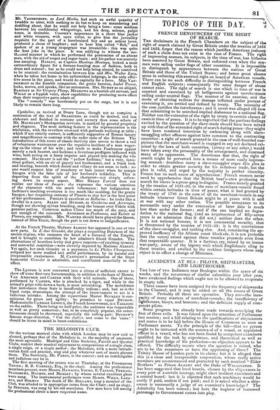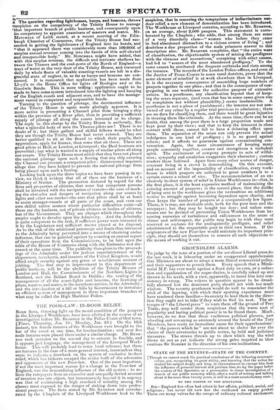ACCIDENTS AT SEA: PILOTS, SHIPMASTERS, AND LIGHTHOUSES.
THE loss of two Indiamen near Boulogne within the space of six weeks, and the recurrence of similar calamities year after year, have awakened feelings which ought not to be allowed to evaporate in empty talk.
Three causes have been assigned for the frequency of shipwrecks in the Channel, and it may be added on all the coasts of Great Britain. Probably all three are operative. They are—the inca- pacity of many masters of merchant-vessels ; the insufficiency of lighthouses, buoys, and beacons ; and the deficient supply of com- petent pilots.
Some progress has already been made towards remedying the first of these evils. It was forced upon the attention of Parliament last session ; and a bill relating to the qualifications of shipmasters and mates is to be laid before the House of Commons as soon as Parliament meets. To the principle of the bill—that no person ought to be intrusted with the command of a vessel, or appointed officer in a vessel, who has not been found by competent examiners qualified for the task by experience, and theoretical as well as practical knowledge of his profession—no objection appears to be offered. The difficulty occurs when the question is raised, who are to be the examiners or have the appointing of them ? The Trinity House of London puts in its claim ; but it is alleged that this is a close and irresponsible corporation, whose really active members are countenanced and protected by such nominal "Elder Brothers" as Prince ALBERT and the Duke of WELLINGTON. It has been suggested that local boards, chosen by the shipowners in every port of a certain tonnage, might elect resident examiners and a central board : but it is objected that such machinery would be costly if paid, useless if not paid ; and it is asked whether a ship- owner is necessarily a judge of an examiner's knowledge ? The Admiralty has been named ; but here the bugbear of increased patronage to Government comes into play. A The question regarding lighthouses, buoys, and beacons, throws °Suspicion on the competency of the Trinity House to manage 'that important branch of public business, and consequently upon its competency to appoint examiners of roasters and mates. Mr. MITCHELL of Leith stated, at a recent meeting of the Edin- burgh Chamber of Commerce, that the Trinity House had suc- ceeded in getting the lighthouses of England into its hands, and "that it appeared there was considerably more than 100,0001. of surplus annual revenue coming into the bands of this self-elected and irresponsible body." Mr. MITCHELL might have added, that with this surplus revenue, the difficult and intricate shallows be- tween the Thames and the coal-ports of the North of England—a tract of water at the very door of the Trinity House, and traversed daily by whole fleets of valuable coasting-vessels are left in a dis- graceful state of neglect, in so far as buoys and beacons are con- cerned. It is rumoured that application has been made from Lloyd's to the Home Office for lights off Boulogne and at the Goodwin Sands. This is mere trifling : application ought to be made to have some system introduced into the lighting and buoying of the English coasts and adjacent seas, and to have the manage- ment vested in competent and responsible hands. Turning to the question of pilotage, the detrimental influence of the Trinity House is again made glaringly apparent. It is more active in preventing a Channel pilot from bringing a ship within the province of a River pilot, than in providing a sufficient supply of pilotage all along the coasts intrusted to its charge. The reply to this charge by the Trinity House is uniformly, See what a splendid body of men the Thames pilots are ! There is no doubt of it ; but these gallant and skilful fellows would be what they are though the Trinity House bad never existed. They are better qualified to sit at the Board to which their pupils, their apprentices, apply for licence, than some that sit there. There are good pilots at Hull, at London, at Liverpool; the Deal boatmen are proverbial ; but what is wanted is a supply of similar pilots all along our coasts. The Trinity House must admit that they have not placed the national pilotage upon such a footing that any ship entering the Channel can procure a competent pilot : disinterested inquirers allege that they have helped to prevent the national pilotage from being placed upon such a footing. Looking back upon the three topics we have been passing in re- view, we think it evident that all of them are the business of a Ministry of Marine. The precaution dictated by regard for the lives and properties of citizens, that none but competent persons shall be intrusted with the navigation of vessels—the care of mark- ing the obstacles and dangers of navigation along our coasts by lights and other sea-marks—the care that pilots shall be at hand to assist stranger-vessels at all parts of the coast, and even our own skilful native seamen where particular difficulties exist—all these are the business, not of private citizens or bodies of citizens, but of the Government. They are charges which throughout the empire ought to devolve upon the Admiralty. And the Admiralty is quite competent to the task, if sufficient power were intrusted to it by the Legislature and sufficient means placed at its disposal. As to the risk of the additional patronage and funds thus intrusted
to the Admiralty being perverted into a means of obtaining undue
influence, that can be guarded against by exacting an annual report of their operations from the Commissioners, to be laid upon the table of the House of Commons along with the Estimates and dis- cussed at the same time. The publicity thus given to the proceed-
ings of the Admiralty under the jealous superintendence of the shipowners, merchants, and insurers of the United Kingdom, would afford ample security against any gross or mischievous amount of jobbing. The first step to improvement in this department of public business, will be the abolition of the Trinity Houses of London and Hull, the Commissioners of the Northern Lights in Scotland, and the Ballast Board in Dublin ; the vesting of the
management of all the coast-lights and beacons, the licensing of pilots, masters and mates, in the merchant-service, in the Admiralty ; and the introduction of a bill or bills by Government to introduce an efficient system of management in these important branches of what may be called the High Maritime Police.



























 Previous page
Previous page